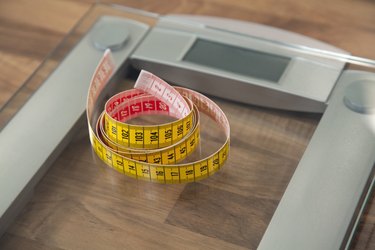
When you're starting out on a diet and transitioning to a healthier lifestyle, it's easy to be lured into wanting to lose weight rapidly. While seeing quick, noticeable progress is satisfying, losing weight too rapidly can be detrimental. For most people, losing 1 pound per day is not only potentially dangerous, but may also be impossible, though there are exceptions.
The Guidelines
Video of the Day
Most people should aim to lose around 1 to 2 pounds per week in the first six months of dieting, according to the National Heart, Lung, and Blood Institute. This works out to between 0.14 and 0.29 pound per day. The institute adds that the overall goal of weight loss in overweight persons should initially be to lose 10 percent of the total starting weight.
Video of the Day
The Numbers
It takes a deficit of 3,500 calories to lose 1 pound of fat. This means that to shift 1 pound, you need to burn 3,500 calories more than you consume. Most people on a weight-loss plan are advised to cut their daily calorie intake by 500 to 1,000 calories, according to the McKinley Health Center at the University of Illinois. This would result in a loss of 1 to 2 pounds per week.
The Starting Point
Losing 1 pound per day may be safe if you have obesity and eating a high number of calories daily. For instance, a person with obesity may be able to maintain his weight by eating 6,000 calories per day. Dropping to 2,500 calories per day is a decrease of 3,500 calories, which would in theory lead to 1 pound of weight loss each day. Over time this would slow down, but it is possible in the initial dieting period.
Different Diets
You may notice rapid weight loss if you switch to a low-carb diet. Dietitian Juliette Kellow notes that this is common on a diet like the Dukan diet, where you can expect to lose 7 to 10 pounds in just five days. This is due to your decreased carbohydrate intake causing a drop in stored glycogen and water weight, which presents itself as a large drop on the scales. These diets carry a high level of risk, however, so it's vital you check with your doctor before embarking on one.